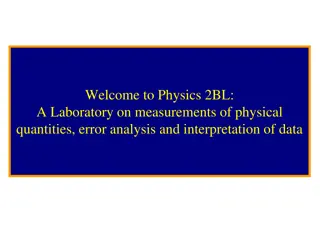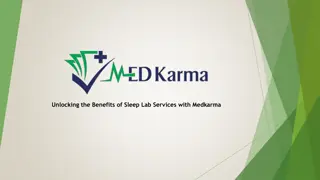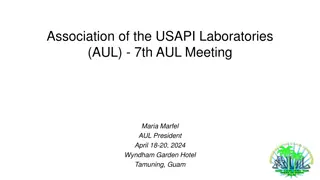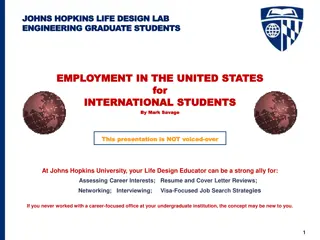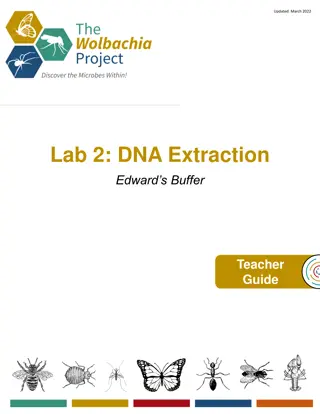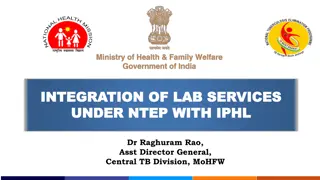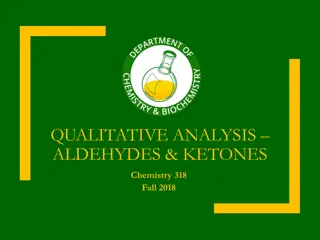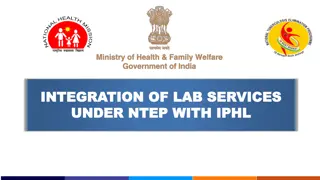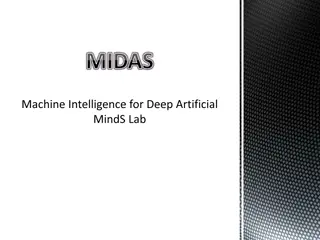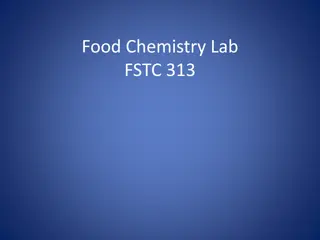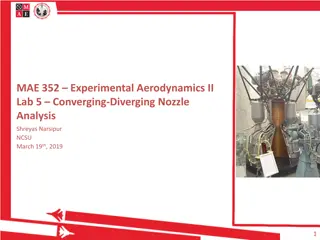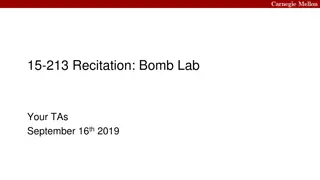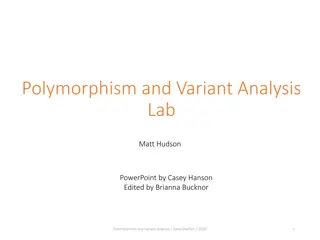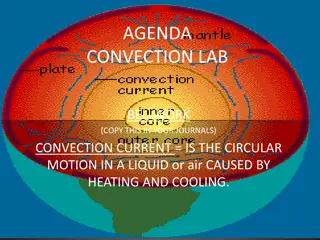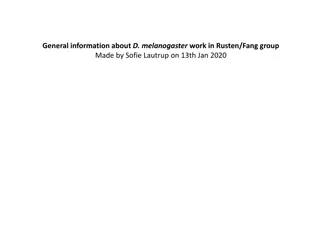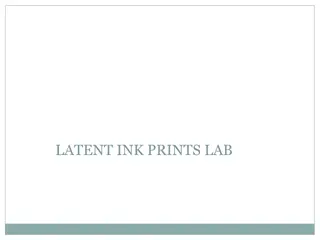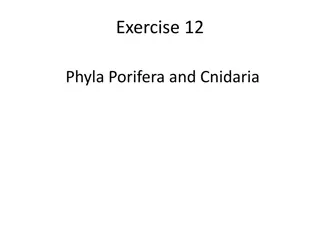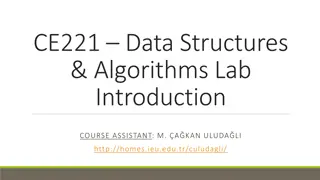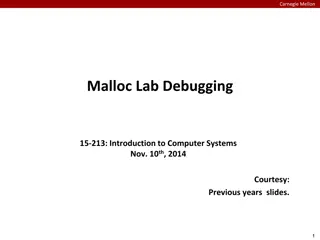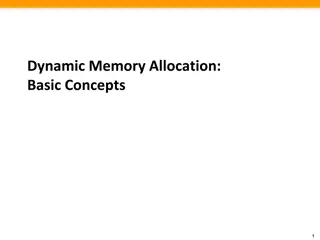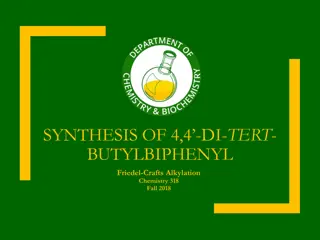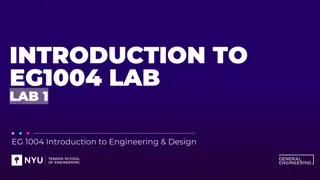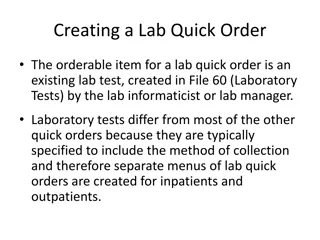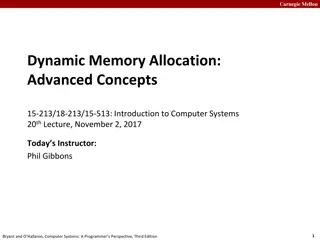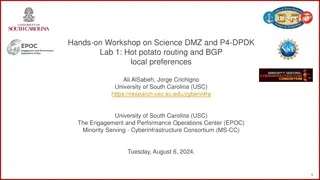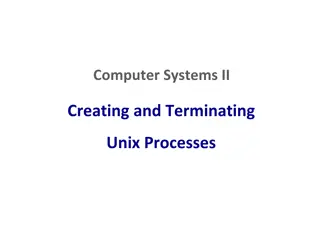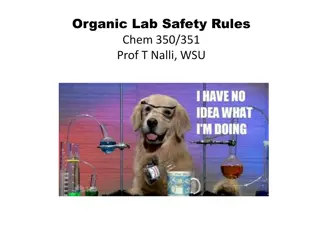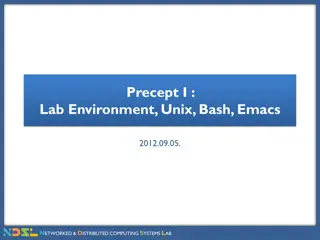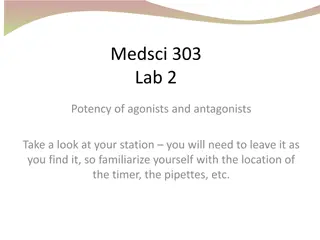Identification of Cardioactive Glycosides in Pharmacognosy Lab Experiments
In this Pharmacognosy lab session, students learn about the identification of cardioactive glycosides through chemical tests like Baljets Test and Keller-Killians Test. These tests involve specific procedures using reagents like picric acid, sodium hydroxide, glacial acetic acid, ferric chloride, an
0 views • 11 slides
Comprehensive Overview of ABE Lab Manual and Foundations of Biotech Package
The ABE Lab Manual, authored by Doreen Osgood, MS, PhD, is a comprehensive resource for biotechnology education, including sequences like Genetic Engineering and Colony PCR. The manual includes teacher and student guides, along with related resources like PowerPoint presentations and lists of labora
1 views • 5 slides
Exploring the Reasons Behind Cannabis Lab Testing
Cannabis lab testing has become an integral aspect of the cannabis industry, ensuring that consumers have access to safe, high-quality products. In this comprehensive guide, weu2019ll explore the reasons behind cannabis lab testing and why itu2019s crucial for both consumers and producers alike.\n\n
12 views • 1 slides
Physics 2BL Laboratory: Measurements, Error Analysis & Data Interpretation
This Physics 2BL laboratory course focuses on measurements of physical quantities, error analysis, and interpretation of data. Students learn how scientists create models of natural phenomena and the practical aspects of conducting scientific experiments. Pre-requisites include Physics 2A, 4A or equ
0 views • 31 slides
Unlocking the Benefits of Sleep Lab Services with Medkarma
In today's fast-paced world, quality sleep is more important than ever. Sleep disorders, which can significantly impact overall health and well-being, are on the rise. This is where sleep lab services come into play. Medkarma, a leading name in the healthcare industry, offers top-notch sleep lab ser
1 views • 7 slides
Association of the USAPI Laboratories (AUL) Overview
The Association of the USAPI Laboratories (AUL) was established to strengthen lab networks in the USAPI countries, promote excellence in laboratory services, serve as a resource for USAPI laboratories, and impact health planning through lab-based surveillance. Key initiatives include adopting lab st
1 views • 14 slides
Johns Hopkins Life Design Lab - Engineering Graduate Students Employment in the United States
Welcome to the Johns Hopkins Life Design Lab, where engineering graduate students can access resources for assessing career interests, resume reviews, networking, interviewing, and visa-focused job search strategies. The lab aims to bridge the gap between employer expectations and student skills, pr
0 views • 17 slides
Dynamic Memory Allocation in Computer Systems: An Overview
Dynamic memory allocation in computer systems involves the acquisition of virtual memory at runtime for data structures whose size is only known at runtime. This process is managed by dynamic memory allocators, such as malloc, to handle memory invisible to user code, application kernels, and virtual
0 views • 70 slides
Lab 2: DNA Extraction Techniques for Arthropods and Wolbachia
In this lab activity, students will learn how to isolate genomic DNA from arthropods and Wolbachia bacteria. The goal is to transition from fieldwork to molecular biology, utilizing DNA as a diagnostic tool. The activity involves extracting total genomic DNA from identified species and includes pre-
0 views • 11 slides
Integration of Lab Services and TB Elimination Mission 2025
This document discusses the integration of lab services under NTEP with IPHL, led by Dr. Raghuram Rao from the Central TB Division, MoHFW. It also outlines the National TB Elimination Mission 2025 goals, diagnostic algorithms, existing lab networks, facility levels, diagnostics expansion, and extern
0 views • 17 slides
Qualitative Analysis of Aldehydes and Ketones in Chemistry Lab
In this Chemistry 318 lab, students will conduct qualitative analysis of aldehydes and ketones using chemical and spectroscopic methods. The lab includes classification tests, spectroscopy (IR, 1H-NMR/13C-NMR, MS), and identification of unknown compounds. Experimental procedures involve physical eva
1 views • 11 slides
Advancements in TB Diagnostics and Quality Assurance
The integration of lab services under NTEP with IPHL aims to improve TB diagnosis and treatment. The National TB Elimination Mission 2025 focuses on reducing TB incidence and mortality rates while preventing catastrophic expenditure. Diagnostic algorithms, existing lab networks, and testing faciliti
0 views • 17 slides
Overview of MIDAS Lab's Cutting-Edge Technology and Research Areas
Explore the impressive technology lineup at MIDAS Lab, including precision workstations like ASUS Expert Centre D700TC_D700 and Dell Precision 5820 Tower Servers. Delve into advanced software packages and licenses, along with fields of research examined by research scholars and UG/PG students. The l
0 views • 9 slides
Food Chemistry Lab FSTC 313 Rules and Regulations
In the Food Chemistry Lab FSTC 313, students are expected to adhere to strict guidelines regarding attendance, lab safety, late policies, missed lab policies, and technical abstract requirements. The lab emphasizes group work, application notes for the food industry, and individual abstract writing
5 views • 24 slides
Opportunities for Undergraduates in Health Research Lab
The Mohan Research Lab offers undergraduates the chance to conduct impactful research that can be published, focusing on biomarkers and targets for autoimmune diseases and cancers. Led by an international team of researchers, the lab provides a collaborative environment for students to engage in cut
4 views • 12 slides
Experimental Aerodynamics II Lab 5: Converging-Diverging Nozzle Analysis
This lab focuses on understanding and analyzing the converging-diverging nozzle in a supersonic wind tunnel facility at NCSU. It involves studying different flow regimes, plotting pressure and temperature variations, and identifying flow conditions based on back pressure ratios. The lab aims to char
3 views • 7 slides
Understanding Memory Allocation in C Programming
This content provides insights into memory allocation in C programming. It covers concepts like malloc, calloc, free, and realloc, illustrating how memory can be dynamically allocated and deallocated. The code snippets demonstrate how to work with arrays and pointers, along with explanations on stac
0 views • 44 slides
15-213 Recitation: Bomb Lab Overview and Tips
This content covers the Bomb Lab exercise in x86-64 assembly code and GDB debugging techniques. It explains the purpose of Bomb Lab, downloading the bomb, detonating the bomb, hints for solving phases, and x86-64 Linux register usage. The material emphasizes the importance of using GDB for efficient
1 views • 42 slides
Polymorphism and Variant Analysis Lab Exercise Overview
This document outlines a lab exercise on polymorphism and variant analysis, covering tasks such as running Quality Control analysis, Genome Wide Association Test (GWAS), and variant calling. Participants will gain familiarity with PLINK toolkit and explore genotype data of two ethnic groups. Instruc
0 views • 43 slides
Precision Assembly Lab Guidelines
This guide provides step-by-step instructions on how to perform a precision assembly lab effectively. From understanding lab assignments to seeking assistance and proper documentation, this resource covers key aspects to ensure a successful lab experience. Following these instructions will help you
2 views • 11 slides
Explore Convection Currents Lab Activity
Engage students in a hands-on lab activity to observe convection currents in action. The agenda includes bell work about convection, a hypothesis on confetti paper movement in hot water, detailed lab procedures, drawing conclusions with CER format, and thought-provoking conclusion questions related
0 views • 7 slides
Clemson ECE Laboratories - Electronics Lab Information
Explore pre-labs for ECE 311 Electronics Lab I, created by Steven Chambers in Fall 2012 at Clemson University. The labs cover topics like curve tracer plots for diodes and transistors, background on Bipolar Junction Transistors (BJTs), instructor and lab coordinator contact information, mandatory sa
0 views • 69 slides
Guidelines for Working with D. melanogaster in Rusten/Fang Group Lab
Detailed information about working with D. melanogaster in the Rusten/Fang Group lab located at Radium Hospitalet in Oslo. This includes details on lab location, shared facility, resources, food preparation, recipe, cleaning procedures, and flipping frequency for the flies.
1 views • 13 slides
Forensic Science Lab: Fingerprint Collection and Classification
Engage in a hands-on forensic science lab to learn how to collect and classify inked fingerprints. In this lab, students will gather prints, use magnifying glasses, and categorize the prints according to specific patterns. Detailed steps and required equipment ensure a thorough understanding of the
0 views • 10 slides
Exploring Diversity in Porifera and Cnidaria Phyla Through Lab Observations
You were exposed to the wide array of animals in the Porifera and Cnidaria phyla in a lab exercise. Understanding the distinguishing features of each group, their roles in the environment, and the structures crucial for identification is key. Focus on bold-faced structures and labeling on diagrams a
0 views • 12 slides
Introduction to CE221 Data Structures & Algorithms Lab with Assistant M. A. Kan Uludağlı
CE221 Data Structures & Algorithms Lab offers opportunities to work on solving selected book questions, quizzes, multiple lab exercises, and coding assignments under the guidance of Assistant M. A. Kan Uludağlı. The assignments will be completed in the lab environment, focusing on Java coding assi
0 views • 7 slides
Debugging Tips for Carnegie Mellon's Malloc Lab
Explore essential debugging strategies for the Carnegie Mellon Malloc Lab, focusing on identifying errors, resolving segfaults, and implementing a heap checker to maintain well-formed heaps. Learn how to efficiently troubleshoot issues and improve your debugging skills in computer systems.
0 views • 19 slides
Dynamic Memory Management Overview
Understanding dynamic memory management is crucial in programming to efficiently allocate and deallocate memory during runtime. The memory is divided into the stack and the heap, each serving specific purposes in storing local and dynamic data. Dynamic memory allocators organize the heap for efficie
0 views • 31 slides
Understanding Dynamic Memory Allocation in Programming
Dynamic memory allocation is a crucial concept in programming where programmers use allocators like malloc to acquire memory at runtime for data structures. This process involves managing the heap, maintaining variable-sized blocks, and utilizing functions like malloc, free, calloc, realloc, and sbr
0 views • 33 slides
Organic Chemistry Synthesis Lab Overview for Fall 2018
The post provides detailed information on the synthesis of 4,4-di-tert-butylbiphenyl through Friedel-Crafts Alkylation in Chemistry 318 for the Fall 2018 semester. It includes a schedule of the lab day, due dates for reports and assignments, grading criteria, pre-lab requirements, and emphasis on si
1 views • 15 slides
Introduction to EG1004 Lab - Engineering & Design Overview
Introductions, lab format, absence and tardy policies, student expectations, course resources, makeup lab policies, and website registration details for EG1004 Introduction to Engineering & Design lab. Learn about lab group formats, quiz procedures, policies on late arrivals and absences, student re
1 views • 10 slides
Managing Lab Quick Orders for Efficient Testing Workflow
Lab quick orders for existing lab tests in an EHR system are crucial for efficient testing workflows. Different menus are created for inpatients and outpatients, specifying collection methods and instructions. This comprehensive guide covers the process of creating lab quick orders, including exampl
0 views • 10 slides
Understanding Dynamic Memory Allocation in Computer Systems
Dynamic memory allocation in computer systems involves the use of memory allocators like malloc to acquire virtual memory at runtime for data structures whose size is only known during execution. Different methods such as implicit lists and explicit lists are used to keep track of free blocks for ef
0 views • 62 slides
Hands-On Workshop on Science DMZ and P4-DPDK Lab
Join the workshop at the University of South Carolina to learn about hot potato routing, BGP local preferences, and hands-on lab activities focusing on network topologies and configurations. Explore the Lab Topology, Lab Configuration, and Platform Information for an interactive learning experience
0 views • 6 slides
CS101 Course Overview and Lab Information
CS101 is a foundational course covering Engineering CAD/Prototyping tools, MATLAB, Unix/Linux, software design, and C programming. The course involves attending lectures, group software projects, quizzes, programming assignments, midterm exams, and regular study of lecture notes. Lab activities are
0 views • 23 slides
Understanding Unix Process Management in Computer Systems II
This overview delves into the creation, termination, memory layout, and dynamic memory management of Unix processes in Computer Systems II. It covers the distinctions between code, executables, and processes, the memory layout of Unix processes, management of heap memory using malloc and free functi
0 views • 27 slides
Organic Lab Safety Rules - Chem 350/351
Chemical safety is paramount in the organic lab. Always wear splash-proof goggles, report injuries promptly, and know the locations of safety equipment. Submit pre-lab plans, work in fume hoods, wear gloves as instructed, and follow lab schedules. Unauthorized experiments and food/drink are prohibit
0 views • 35 slides
Networking and Distributed Computing Systems Lab Setup Guide
Set up your lab environment for networking and distributed computing systems using Unix, Bash, and Emacs. Learn to access lab machines via SSH, use PuTTY and Terminal for communication, simulate Linux environment on Windows with Cygwin, run different OS on VMware Player, download and install Linux o
0 views • 14 slides
Pharmacology Lab Equipment and Safety Guidelines
Explore the setup and procedures of a Pharmacology lab focusing on agonists and antagonists potency testing. Learn about equipment, tissue suspension, lab safety, lab plan, and health precautions. Follow instructions for conducting experiments, recording data, and cleaning up. Utilize resources prov
0 views • 28 slides
Lab Safety
Lab Safety. Professor Lei Zhu\u2019s Research Group 2013.10.09. Outlines. Lab Safety Training Eye Protection Lab Coat Gloves Fume Hoods CHP, ECP Emergency. 1. Lab Safety Training. You can work in the lab only after you finish the lab
9 views • 10 slides



